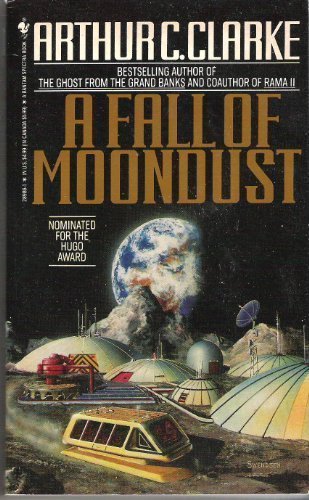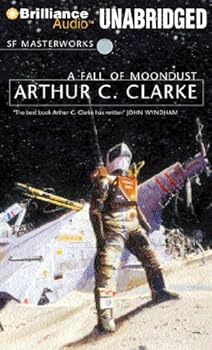
![]() A Fall of Moondust by Arthur C. Clarke
A Fall of Moondust by Arthur C. Clarke
Pat Harris is the captain of Selene, the only tour bus on the moon. Every day he and his stewardess, Sue Wilkins, take passengers on a trip across the moon’s Sea of Thirst. This crater filled with moondust seems similar to a lake on Earth, and Selene, like a motorboat, smoothly skims across its surface. By the light of Mother Earth, Selene’s passengers are entertained by glorious views of the moon’s topography, including the impressive Mountains of Inaccessibility.
Pat Harris loves his job. Selene is an excellent dust cruiser, Pat enjoys skimming along the dust and delighting his passengers with the moon’s views, and he has a secret crush on his stewardess. But Pat’s and Sue’s wits and characters will be severely tested when an unexpected moonquake shakes the Sea of Thirst and Selene sinks into the dust. Communications are cut off and nobody knows where they are. Now Selene’s crew and passengers must work together to try to save themselves while scientists and technicians from Earth and the moon are frantically trying to locate them.
 Arthur C. Clarke’s A Fall of Moondust (1961) is a science fiction thriller which was first published in 1961 and was nominated for a Hugo Award. I like Clarke’s dramatic stories and his no-nonsense writing style and I love both SF and survival fiction, so I knew A Fall of Moondust would be a winner for me.
Arthur C. Clarke’s A Fall of Moondust (1961) is a science fiction thriller which was first published in 1961 and was nominated for a Hugo Award. I like Clarke’s dramatic stories and his no-nonsense writing style and I love both SF and survival fiction, so I knew A Fall of Moondust would be a winner for me.
At only 224 pages (trade paperback) and 8 hours in audio, this was a short fast read with plenty of nail-biting tension and psychological drama. Plus, as Clarke fans will expect, lots of scientific ideas and hypotheses, too. Character development is a bit lacking, since the book is so short, but the insights we get about Pat Harris and Sue Wilkins, as their characters are tested in an ongoing life-threatening situation, are rewarding, and I was really rooting for them by the end of the story.
I read Brilliance Audio’s version of A Fall of Moondust which was narrated by Oliver Wyman. This was the first time I’ve heard this narrator and I thought he was perfect. He did a great job with all the characters and his reading was enthusiastic without being overdramatic. He sucked me right into the story and I listened nearly straight through, finishing the novel on the day I started it.
A Fall of Moondust probably isn’t for everyone, due to its quick pace and focus on survival rather than world-building or character development, but readers who like hard SF and survival stories will be very pleased.



I remember really liking this from my childhood reading – great to see the classics revisited on this site. Thanks for the review!
SF of the 60s was rather different from today’s. Novels were commonly about 150 pages. A 200 page novel was long, Dune was gigantic. Writers did not have word processors, that started in the 80s.
But Clarke said a lot about infrared in that novel and used Plato’s Allegory of the Cave to discuss what and how we understood reality. Back in the day I remember having three encyclopedia open on my bed while researching the information in one science fiction book. Many of today’s longer novels have characterization and world building but are not exactly intellectually stimulating.
You bring up some great points, Karl!
I think some of readers’ differences in reading preferences may come from our motivation for reading them in the first place. I definitely prefer for my books to be intellectually stimulating, but my job is so intellectually demanding that I don’t NEED that from a book.
When I’m reading, I like to escape into a different world and meet and learn from people who I wouldn’t normally encounter. The book needs to entertain me that way. I gravitate toward SF, and I like to use my brain while reading fiction, just because that fits my personality, but I don’t necessarily NEED to be challenged and I don’t usually want to STUDY while reading for pleasure, because I study so much for my job. Sometimes I just want a break from the kind of thinking I do for most of the day. But if I didn’t have a challenging job, I would probably love getting out the dictionaries and encyclopedias while reading. :)
I enjoy discussing these books with you, so thanks for the comments!!
Another interesting review:
http://www.tor.com/2010/09/29/a-future-that-never-came-arthur-c-clarkes-a-fall-of-moondust/
Karl, thanks for that link!